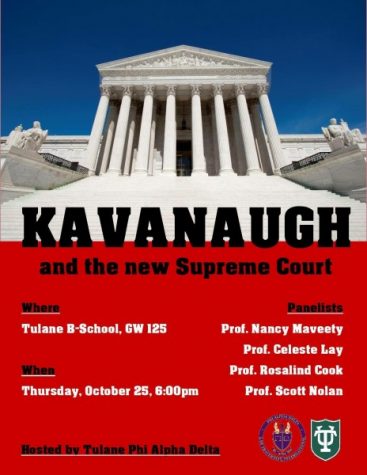Phi Alpha Delta hosts “Kavanaugh and the new Supreme Court” panel
The nomination of Brett Kavanaugh to the U.S. Supreme Court following the retirement of Justice Anthony Kennedy has been a point of controversy across the nation. On campus, the nomination has not failed spark conversation.
Tulane’s pre-law fraternity, Phi Alpha Delta, assembled a panel of political science professors last Thursday to discuss the role of the Supreme Court in American politics today and in future years.
The panel consisted of Associate Professor of Political Science Celeste Lay, Assistant Professor of Political Science Scott Nolan, Adjunct Professor Rosalind Cook and Political Science Department Chair Nancy Maveety. Phi Alpha Delta President Bronte Foley moderated the discussion.

Foley began by asking about the notable ideological shifts that have occurred in the Court in the 20th and 21st centuries.
Maveety, who specializes in the Supreme Court and is teaching a class called Picking Judges in the spring of 2019, outlined the patterns of dominant majorities in electoral politics that have shifted over time.
Comparing the Fuller and White Courts (1888-1921) to the Roberts Court (2005-Present), Maveety claims that both eras saw a period of pro-business and conservative decisions issued by the Court that heavily supported laissez-faire economic policy.
Scott Nolan, an expert on American government, courts, constitutional law and LGBT politics, first conceptualized the Court using three “lines” on how the public reacts to the Court’s decisions.
The first line, Nolan said, deals with “how efficient the Court deals with litigation and requirements … ‘the muck of the court.'” The second line consists of economic interests, and the final line describes social issues.
Nolan describes the current Court as leaning center-right on business and economic issues, but as moderate on social issues. This, he said, is largely due to the decisions of Justice Anthony Kennedy, who has constantly voted with the liberal bloc on issues such as reproductive choice and LGBTQ+ rights but tended to vote with more right-leaning judges in favor of economic freedoms.
Before ending the discussion, Foley asked the panelists whether the nominating president’s party affiliation influences the ideology of the judges he nominates to the bench. Lay, who focuses on public policy, education, elections and campaigns, claimed that there have been a few notable justices that have not behaved the way the presidents who nominated them anticipated.
Lay specifically mentioned Earl Warren, who was nominated by Republican President Dwight D. Eisenhower in 1954. According to Lay, he ended up leading a fairly liberal court which presided over cases involving desegregation, reapportionment, due process and the First Amendment.
The discussion was followed by a Q&A session with the audience. When asked the question if she believed Justice Kavanaugh is fit to serve on the Supreme Court, Maveety answered, constitutionally speaking, he is.
“Although he exhibited what a lot of people would say was a non-judicial demeanor and perhaps crossed the line into becoming a partisan advocate … beyond that I think we have to admit the hard thing is yes, he probably is qualified,” Maveety said.
The final question asked was “given the way that these hearings were held, what precedent does this set for Supreme Court nominees in the future?”
Cook referenced the 1991 nomination of Clarence Thomas to the Supreme Court and how it led to the so-called “Year of the Woman,” which encouraged many more women to get involved with politics.
“Women are going to do something to change this,” Cook said.
Your donation will support the student journalists of Tulane University. Your contribution will allow us to purchase equipment and cover our annual website hosting costs.



Leave a Comment